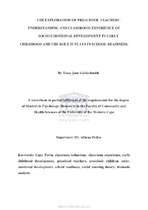| dc.contributor.advisor | Pedro, Athena | |
| dc.contributor.author | Goldschmidt, Tessa Jane | |
| dc.date.accessioned | 2019-05-23T12:31:40Z | |
| dc.date.available | 2019-05-23T12:31:40Z | |
| dc.date.issued | 2019 | |
| dc.identifier.uri | http://hdl.handle.net/11394/6834 | |
| dc.description | Magister Psychologiae - MPsych | en_US |
| dc.description.abstract | The socio-emotional development of children has an extremely important impact on the overall development of children. Globally, extensive research has been dedicated to the socio-emotional development of children with regard to play, socio-emotional programmes, school readiness and school success. However, there is limited current research within the South African context relating to socio-emotional development in early childhood and its importance for school readiness, specifically from the views of educators. This study explored preschool teachers’ understanding and classroom experience of socio-emotional development in early childhood and the role it plays in school readiness. This study utilises the Albert Bandura’s social learning theory which posits that adults function as “environmental experts who model appropriate behaviours and structures the environment” in ways that encourage appropriate behaviours in children. A qualitative methodological framework with an exploratory research design was used. A total of 12 preschool teachers from both community-based preschools and primary schools with a Grade R programme were recruited. Data were collected with semi-structured interviews and analysed thematically in accordance with Braun and Clarke (2006). Participants’ rights such as informed consent, anonymity and confidentiality were guaranteed throughout the research process. Ethics guidelines stipulated by the Humanities and Social Sciences Research Ethics Committee at the University of the Western Cape were strictly adhered to. The main findings were that preschool teachers understand socio-emotional development as consisting of inter- and intrapersonal skills. Teachers viewed themselves as role models who encourage and model appropriate and prosocial behaviour in the classroom. Lastly, preschool teachers view age appropriate development in all areas as absolutely essential for school readiness. | en_US |
| dc.language.iso | en | en_US |
| dc.publisher | University of the Western Cape | en_US |
| dc.subject | Early childhood development | en_US |
| dc.subject | Preschool | en_US |
| dc.subject | Teachers | en_US |
| dc.subject | Preschool teachers | en_US |
| dc.subject | Cape Town | en_US |
| dc.subject | South Africa | en_US |
| dc.title | The exploration of preschool teachers' understanding and classroom experience of socio-emotional development in early childhood and the role it plays in school readiness | en_US |
| dc.rights.holder | University of the Western Cape | en_US |

